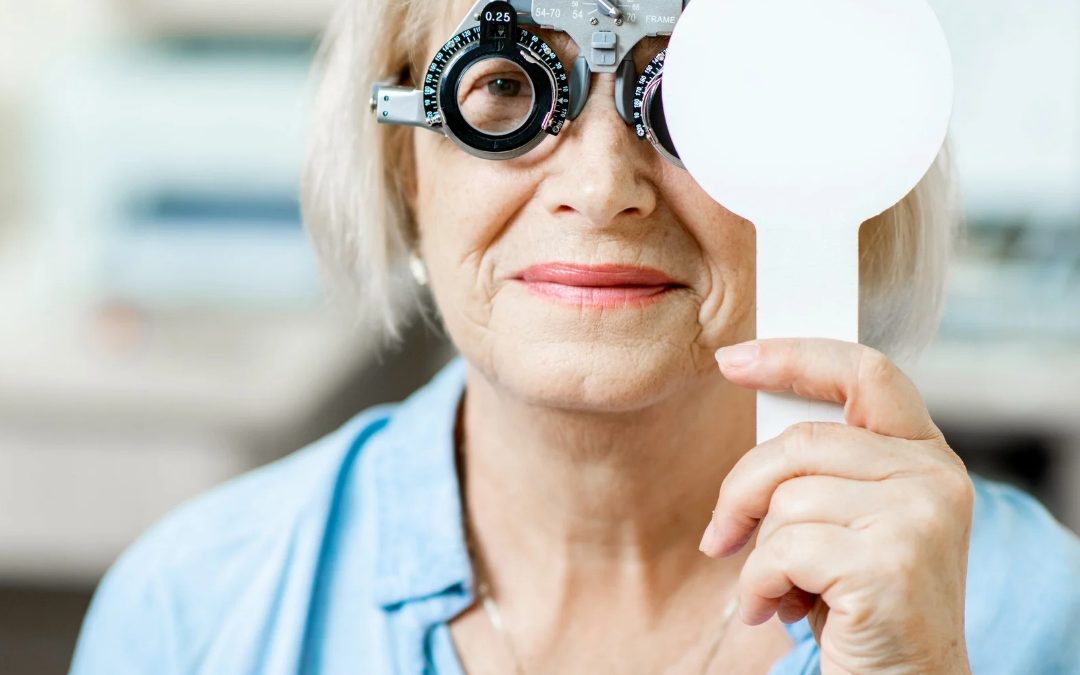Vision loss is a serious issue because our vision is a vital sense that significantly influences our daily lives, especially as we age. For seniors, maintaining good vision is crucial for independence and quality of life.
However, vision loss can profoundly impact daily activities, safety, and emotional well-being, leading to a loss of independence. At Your Home Team Care, we recognize the importance of addressing vision loss and its implications to help our senior clients live fulfilling lives. In this blog post, we will explore how vision loss affects seniors, how to manage its impact and offer tips for prevention.
The Prevalence of Vision Loss in Seniors
As we age, our risk of developing vision-related issues increases. Common age-related eye conditions include:
- Cataracts: A condition where the eye’s lens becomes cloudy, causing blurry vision and difficulty seeing in low light.
- Age-Related Macular Degeneration (AMD): Affects the central part of the retina, leading to loss of central vision, which is crucial for activities like reading and recognizing faces.
- Glaucoma: A group of eye conditions that damage the optic nerve, potentially leading to permanent vision loss if not treated early.
- Diabetic Retinopathy: A complication of diabetes that affects the blood vessels in the retina, leading to vision impairment.
These conditions can lead to partial or complete vision loss, significantly impacting a senior’s ability to live independently.
How Vision Loss Affects Independence
- Reduced Mobility and Increased Risk of Falls: Vision loss can make navigating familiar environments challenging and navigating new ones even more daunting. Reduced depth perception and visual acuity can increase the risk of falls, which are a leading cause of injury among seniors.
- Difficulty with Daily Activities: Simple tasks like reading, cooking, or managing medications can become difficult or even impossible without adequate vision. This can lead to a reliance on others for help with basic activities of daily living (ADLs), reducing a senior’s sense of independence.
- Limited Social Interaction: Social interactions often rely on non-verbal cues and facial expressions, which can be difficult to discern with impaired vision. This can lead to social withdrawal, isolation, and even depression.
- Emotional and Psychological Impact: Vision loss can lead to feelings of frustration, anxiety, and a loss of confidence. The fear of losing more vision or experiencing accidents can also cause significant stress.
- Challenges with Transportation: Many seniors rely on their ability to drive to maintain independence. Vision impairment can restrict driving, limiting access to essential services, social activities, and even healthcare.
“One critical factor that can significantly impact a senior’s independence is their vision. Healthy vision is essential for maintaining a senior’s independence especially with simple everyday tasks such as reading, driving, cooking, and even navigating one’s home.”
Managing the Impact of Vision Loss
While vision loss can be challenging, there are ways to manage its impact and maintain a level of independence:
- Home Modifications: Making simple modifications, like adding better lighting, using contrasting colors to distinguish different areas, and reducing clutter, can help seniors navigate their homes more safely.
- Assistive Devices: Magnifiers, talking clocks, large-print books, and other assistive devices can help seniors manage daily tasks.
- Vision Rehabilitation Services: Vision rehabilitation professionals can provide training and resources to help seniors adapt to vision loss and maintain their independence.
- Support Systems: Encouraging a strong support network, including family, friends, and community resources, can help seniors feel connected and supported.
To support healthy vision and independence, it’s important to take proactive steps:
- Regular Eye Exams: Early detection and treatment of eye conditions can prevent or slow vision loss. Regular eye exams are essential for seniors to monitor their eye health.
- Wear Prescription Eyewear: Ensure that glasses or contact lenses are up-to-date and worn as prescribed. Wearing the correct prescription helps reduce eye strain and improves clarity.
- Protect Your Eyes from UV Rays: Wearing sunglasses with 100% UVA and UVB protection and wide-brimmed hats, we can help seniors protect their eyes from UV damage. This, in turn, supports their overall eye health and helps them maintain a more active, independent lifestyle.
- Maintain a Healthy Diet: A diet rich in antioxidants, such as vitamins A, C, and E, and omega-3 fatty acids can promote eye health. Foods like leafy greens, fish, and nuts are excellent choices.
At Your Home Team Care, we are dedicated to supporting our senior community by providing comprehensive care that includes addressing vision health. Our team is here to assist with daily activities, offer transportation, and provide companionship to ensure our clients continue to lead fulfilling, independent lives.
If you or a loved one is experiencing vision loss, remember that you’re not alone. With the right support and resources, it’s possible to maintain a high quality of life and continue enjoying the activities you love.
Information Source:
American Optometric Association – https://www.aoa.org/healthy-eyes/eye-health-for-life/senior-vision?sso=y
Time To Be Bold – https://timetobebold.org/state-directory/

